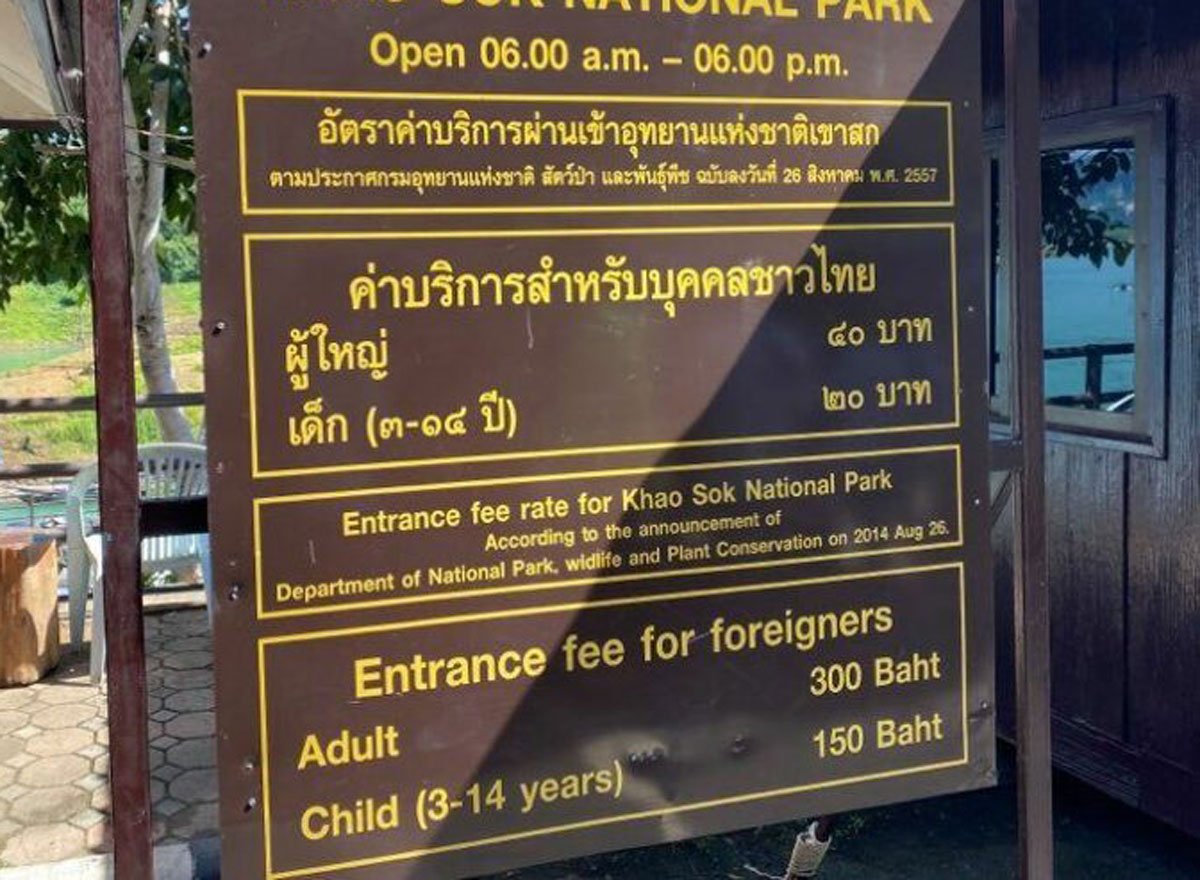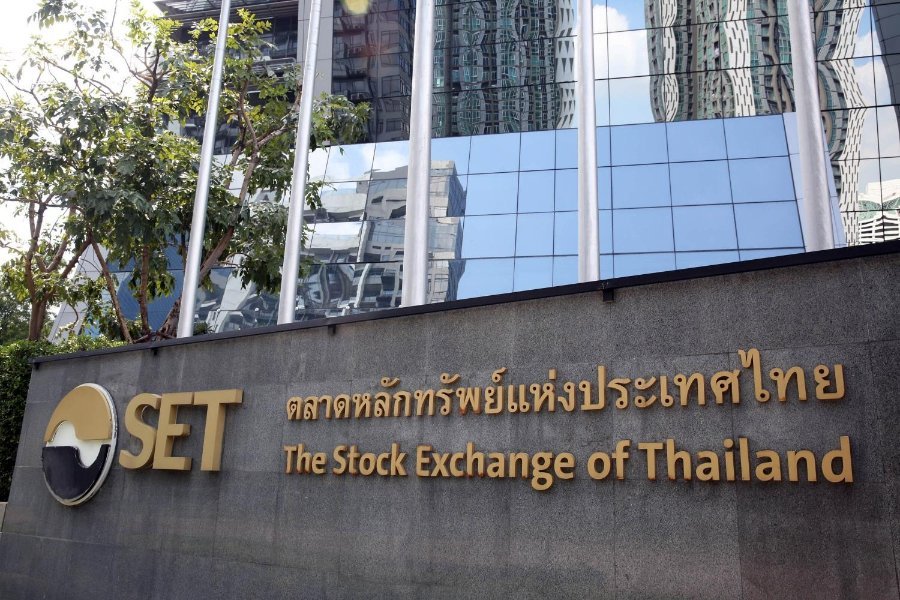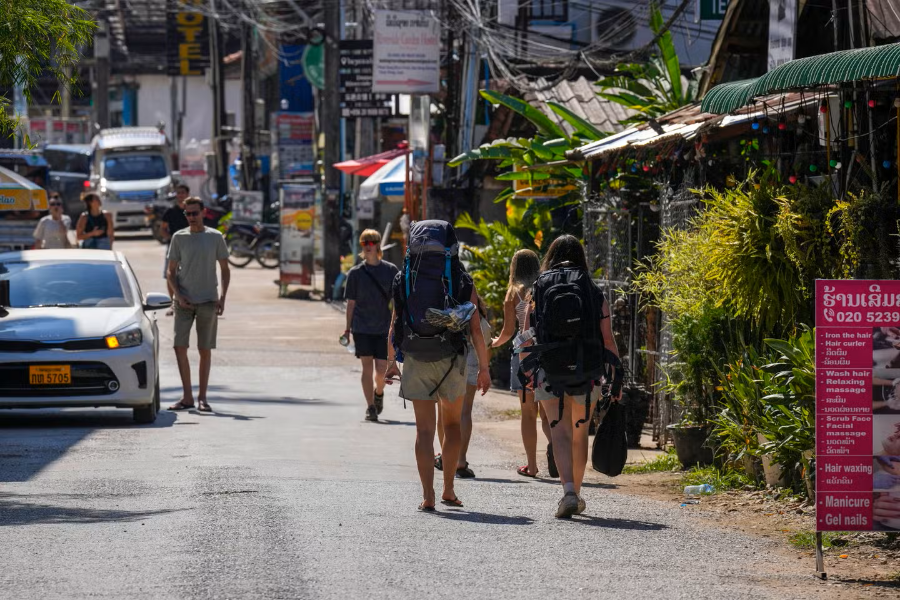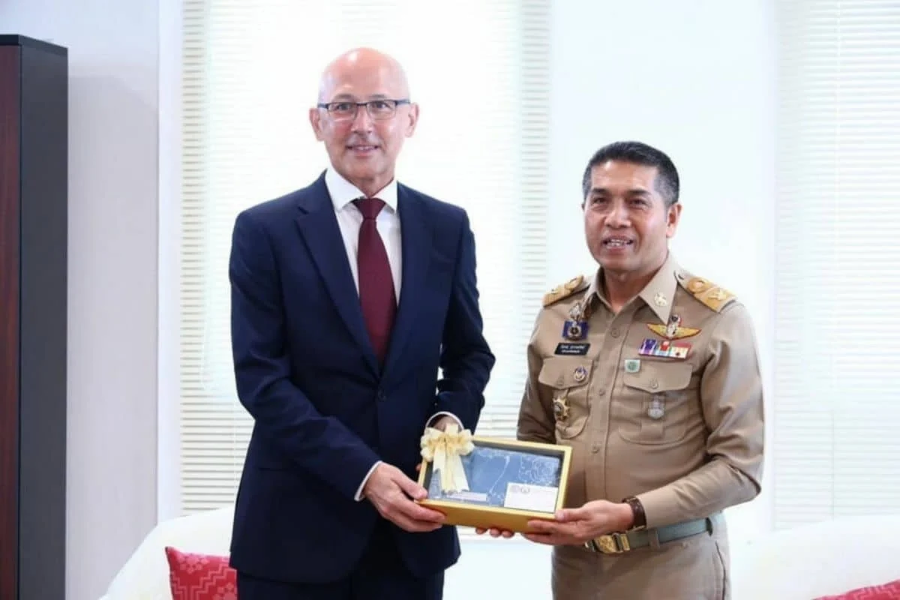Nyheter fra Thailand - levert av ASEAN-now (Tidligere Thai Visa)

My RSS Feed
- Thailand’s Emergency Alert System Goes Live in Major Test

File photo for reference only
Thailand is set to activate its cutting-edge emergency alert system with a series of crucial tests using cell broadcast technology, starting on Friday, May 2.
The effort is led by the Department of Disaster Prevention and Mitigation (DDPM) in conjunction with the nation's leading mobile operators, targeting over 120 million mobile numbers on Android and iOS platforms.
The initial test, scheduled for 1 PM on May 2, will be conducted in limited locations, namely:
Provincial halls of Chiang Rai
Ubon Ratchathani
Suphan Buri
Songkhla
Government Complex Chaeng Watthana in BangkokA second, broader test on May 7 will expand to district-level locations including:
Mueang Districts in Lampang
Nakhon Sawan
Nakhon Ratchasima
Surat Thani
Din Daeng District in BangkokThe final test on May 13 will encompass entire provinces, with coverage in:
Chiang Mai
Udon Thani
Ayutthaya
Nakhon Si Thammarat
Bangkok
During these trials, phone users will see alerts with the following messages in Thai and English:
“ทดสอบแจ้งเตือนภัย Cell Broadcast จากกรมป้องกันและบรรเทาสาธารณภัย (ปภ.) โปรดอย่าตื่นตระหนก”
“This is a test message from the Department of Disaster Prevention and Mitigation (DDPM). No action required.”For the alerts to be received, devices must operate on Android 11 or iOS 18 and be connected to a 4G/5G network. Alerts will not reach devices that are turned off, in airplane mode, using Wi-Fi exclusively, or connected to 2G/3G networks.
The cell broadcast technology differentiates itself by quickly delivering messages within specified geographic boundaries, eliminating the need for specified phone numbers and additional applications.
Since the 2004 Boxing Day tsunami, Thailand has sought to implement such a system, with renewed urgency following the March 28 earthquake in Bangkok that exposed the need for improved emergency communications.
 Adapted by ASEAN Now from Bangkok Post 2025-04-30
30 April 30 20251359243
Adapted by ASEAN Now from Bangkok Post 2025-04-30
30 April 30 20251359243 - Abandoned Abroad: British Pensioner in Thailand Slams 'Immoral' Frozen Pensions Policy

Picture of Christopher Lee courtesy of the iPaper
A British expat's sunny retirement in Thailand has turned stormy as his UK state pension remains frozen, leaving him counting every baht. Christopher Lee traded Wrexham for Thailand in 2010, drawn by the warm climate and relaxed lifestyle. But, his pension is stuck at its original rate, unlike UK counterparts who've seen increases of up to 80%.
At 70, the former banker relies on a weekly £137 (6,150 baht) after a SERPS top-up, opposed to the current UK basic pension of £176.45 (7,880 baht). In Thailand, one of many countries on the UK’s 'frozen pensions' list, Lee and others see their pensions diminish amidst rising costs.
Over 450,000 Brits in countries like Thailand, Australia, Canada, and New Zealand share Lee's plight, battling constant inflation. “The extra cash would be most useful,” Lee voiced, pressing for a policy reversal as financial strains increase. Adding to his woes is a modest private pension that fails to deliver the retirement he envisioned.
Groups of British pensioners in Thailand are pushing back, urging government reform as pensioners face poverty—a plight highlighted in The Thaiger's coverage of Brits struggling in Pattaya and Chiang Mai. The UK government, however, maintains that adjusting overseas pensions would cost nearly £1 billion annually.
The Department for Work and Pensions reported it would take an estimated £940 million to unfreeze pensions in 2024-25. While officials insist information is clear on retirement financial impacts, Lee and others find this unsatisfactory. "We've paid in, so we deserve annual increases," he argued.
For expats like Lee, the reality is stark—a life of rising prices and tightened budgets, far removed from the warm retirement once imagined under the Thai sun.
 Adapted by ASEAN Now from The Thaiger 2025-04-28
28 April 28 20251359036
Adapted by ASEAN Now from The Thaiger 2025-04-28
28 April 28 20251359036 - Supreme Court Dismisses Lawsuit Against Thaksin Shinawatra

File photo for reference only
In a significant legal development, the Supreme Court has once again dismissed a lawsuit against former Prime Minister Thaksin Shinawatra, who is also the father of current Prime Minister Paetongtarn Shinawatra and a prominent figure in the Pheu Thai Party. The lawsuit, brought forth by former lawmaker Charnchai Israsenarak, accused Thaksin and the Corrections Department of unlawfully circumventing legal procedures.
Thaksin, a billionaire and influential political figure, had previously been sentenced to eight years in prison for power abuse during his tenure as prime minister. However, this sentence was reduced to one year under a royal pardon. The controversy arose when the Corrections Department transferred Thaksin to a Police Hospital VIP ward, citing health concerns, without obtaining prior court approval—an action Israsenarak claims amounted to a contempt of court.
Despite these allegations, the Supreme Court judges ruled that the Corrections Department's post-conviction actions fall outside the court's jurisdiction. As a result, no further hearings will take place, effectively exonerating Thaksin and the Corrections Department officials from these charges.
This marks the third attempt by Charnchai Israsenarak to hold Thaksin accountable in court since 2023, each time met with dismissal. The case has stirred public debate, with suspicions that Thaksin orchestrated a health-related ruse to avoid imprisonment.
Thaksin's case highlights intricate dynamics in Thailand's legal and political landscape, as well as the ongoing public discourse about justice and accountability among high-profile figures.
 Adapted by ASEAN Now from Thai Newsroom 2025-04-30
30 April 30 20251359314
Adapted by ASEAN Now from Thai Newsroom 2025-04-30
30 April 30 20251359314 - Dual Pricing in Thai Tourism: Economic Necessity or Hidden Bias?

FILE photo for reference only
ANALYSIS
Thailand's dual pricing policy, where foreign tourists often pay more than locals at attractions, sparks ongoing conversation. This practice, grounded in economic rationale, sometimes stirs feelings of exclusion among visitors, leading to mixed reviews and accusations of inequity—although it's crucial to note the difference between nationality-based pricing and racial discrimination.
Visitors to popular destinations, such as temples and national parks, encounter this tiered pricing structure, which charges foreigners higher fees compared to local residents.
Supporters argue it boosts domestic tourism by offering locals affordable access to cultural sites and helps fund and sustain these attractions amidst the influx of foreign tourists. Defending this strategy, proponents assert it's necessary for the upkeep of the nation’s cultural heritage, ensuring its preservation for future generations.
Opinions diverge sharply on this issue. Critics label it as an unfavourable practice that creates a rift between locals and tourists. Many visitors feel targeted due to nationality-based pricing, viewing it as an implicit form of discrimination.
While not racially motivated, this differential treatment based on nationality can unintentionally harm Thailand’s reputation as a hospitable destination, provoking feelings of inequity among international travellers.
Furthermore, the higher costs could deter some tourists, potentially affecting Thailand's competitiveness compared to neighbouring nations without such policies. Charges for foreigners can be significantly steeper, leading tourists to question the fairness of paying more for identical experiences as locals.
Nevertheless, Thailand remains a magnetic tourist destination thanks to its diverse cultural offerings. Despite higher fees, many visitors continue to flock to its renowned sites, suggesting that the exotic appeal outweighs financial grievances, at least for now. Advocates for dual pricing insist that these funds are critical for sustaining the infrastructure and services that make the sites attractive and accessible to all visitors.
The challenge moving forward lies in balancing the financial needs of maintaining tourist attractions with maintaining Thailand's image as an open and inclusive environment for all travellers.
Exploring a more balanced pricing strategy that respects both local and global visitors might enhance Thailand's tourist appeal and mitigate feelings of exclusion. Transparent dialogue about the purpose and benefits could bridge divides, fostering a more understanding atmosphere among international guests and aligning economic strategies with Thailand’s longstanding tradition of warm hospitality, reported Pattaya Mail.
-- 2024-12-06
6 December 06 20241345479 - Moody's Shifts Thailand's Economic Outlook to Negative Amid Rising Risks

File photo for reference only
Moody's Ratings has maintained Thailand’s Baa1 issuer and local currency ratings, but the economic outlook has shifted from stable to negative. This change highlights growing concerns over Thailand's economic and fiscal resilience, with Moody's expressing worry about slowing economic momentum and increased vulnerability to external shocks, exacerbated by shifting global trade dynamics.
Thailand's export-dependent economy is particularly sensitive to rising protectionism, especially following recent US tariffs and potential further trade restrictions. OECD data show that Thailand's value-added exports to the US accounted for approximately 3% of GDP in 2020, making the country particularly susceptible to these changes. Additionally, Thailand's role in regional supply chains means it faces indirect risks, particularly if US-China trade tensions lead to an influx of Chinese goods in Thai markets, hindering domestic production.
Investment sentiment has also been dampened, with historical data suggesting trade tensions discourage foreign direct investment (FDI). During the 2018–2019 US-China trade conflict, Thailand saw notable dips in FDI and capital investment. Further reduction in supply chain diversification, particularly under the “China+1” framework, could strain long-term capital flows.
Compounded by a recent earthquake in Myanmar, which has raised regional safety concerns, these issues could further impact Thailand’s critical tourism sector. Moody’s now projects Thailand’s real GDP growth to slow to around 2% in 2025, a downward revision from a previous forecast of 2.9%. This outlook reflects existing structural weaknesses, including a shrinking labour force and skill gaps. Reduced growth prospects threaten fiscal consolidation efforts, especially given Thailand's rising public debt, projected to reach approximately 56% of GDP in 2024.
Despite these challenges, Thailand’s Baa1 rating remains supported by sound macroeconomic management, robust domestic capital markets, and strong external buffers. Inflation is low, and interest payments are well contained. The country’s foreign exchange reserves amount to $215 billion, safeguarding against potential external financial shocks.
Moody’s cautions about long-term risks, citing Thailand’s ageing population and environmental vulnerabilities, such as flooding and agricultural stresses. Yet, the nation's strong governance and track record of macroeconomic stability lend significant resilience.
As Thailand navigates these challenges, Moody’s indicates a rating upgrade is unlikely in the short term given the negative outlook. Improved growth and fiscal metrics could stabilise the outlook, while persistent weak growth or political disruptions could lead to a downgrade.
 Adapted by ASEAN Now from The Nation 2025-04-30
30 April 30 20251359313
Adapted by ASEAN Now from The Nation 2025-04-30
30 April 30 20251359313 - Sensational Shower Livestream: Thai Singer "Beer The Voice" Stuns Fans

Pictures courtesy of Sanook
Fans were left breathless after Thai singer "Beer The Voice" took her audience on a jaw-dropping journey during a viral livestream on April 29th. Known for her sweet vocals and striking looks, Beer has a knack for pushing the envelope, and her latest venture certainly upped the ante. The singer hosted a livestream on her personal social media account, where she boldly took a shower wearing a striking yellow bikini.
The daring livestream sent shockwaves through her fanbase as Beer confidently showcased her figure. What truly turned heads was when she casually began loosening her bikini straps mid-stream, adding a touch of unexpected drama that left viewers stunned and eager for more.
The clip quickly spread across social media, igniting a flurry of reactions. Admirers flooded the comment section with a mixture of awe and amusement, with comments like, “Beer is going all out,” “Really hot,” and playful references to online slang acknowledging the irresistible charm on display.
Beer’s captivating performance showcased her flair for entertainment, solidifying her reputation as an entertainer who knows how to engage an audience deeply. Her alluring image has always been part of her public persona, yet it’s her ability to balance boldness with charm and a sense of approachability that continually draws fans back.
Despite the provocative nature of the livestream, many netizens applauded her confidence and praised her ability to be cheeky without overstepping boundaries. Her playful demeanor continues to endear her to fans of all ages, turning each of her posts, videos, or livestreams into an instant hit.
Originally gaining fame on The Voice Thailand, Beer has since established herself as more than just a talented singer. Her presence as a social media sensation with formidable star power is undeniable. However, her latest stunt has prompted some concerns for her well-being, highlighting potential mental health issues.
As the conversation around her bold livestream continues, it underscores the complex dynamics of celebrity in the digital age, where the line between entertainment and personal boundaries can sometimes blur.
 Adapted by ASEAN Now from The Thaiger 2025-04-30
30 April 30 20251359307
Adapted by ASEAN Now from The Thaiger 2025-04-30
30 April 30 20251359307 - Rising Prices, Broken Systems Dim Thailand’s Tourist Charm

File photo for reference only
Thailand, once a beacon for budget-conscious travellers worldwide, is increasingly facing criticism from international tourists over escalating costs and shifting experiences. Historically renowned for its picturesque beaches, lively cities, and affordability, the kingdom is now being reevaluated by tourists disenchanted with what it currently offers.
Cost Concerns: Value for Money Diminishing
In recent weeks, a surge of online complaints—evident through nearly 2,000 comments on a Bangkok Post Learning social media post—has echoed the sentiment that Thailand is no longer the cost-effective destination it once was. Travellers have noted exorbitant increases in accommodation prices, especially in popular tourist enclaves such as Koh Samui and Pattaya. For instance, visitors report that hotel rates have tripled, with dining expenses for a simple meal skyrocketing to unprecedented levels.
While global inflation plays a role, many argue that Thailand's price hikes outpace standard inflation, describing the increases as "pure greed." Tourists who previously paid $300 for a flight to Thailand now face fares nearing $1,000, a substantial deterrent for those attracted to Thailand’s erstwhile affordability.
Bureaucracy Blues: Navigating a Maze of Regulations
Another major grievance is the increasingly cumbersome visa and immigration processes. The mandatory TDAC system, requiring prior online registration, has proven especially vexing for older, less tech-savvy travellers. Additionally, the reduction of tourist visa duration from 60 to 30 days has displeased long-stay visitors, further complicating travel plans for those seeking extended stays.
Cannabis Concerns: A New Identity Taking Shape
Thailand's liberalisation of cannabis laws, once heralded as progressive, has led to an unexpected identity crisis. Many visitors express their discomfort with the widespread aroma of cannabis, particularly those travelling with children. The pervasive smell is seen as detracting from Thailand's family-friendly appeal and drawing tourists more interested in partaking in cannabis than enjoying traditional attractions.
Two-Tier Pricing: Fueling Frustrations
Adding to the grievances is the clear disparity in pricing between locals and foreigners. Tourists recount paying significantly higher entry fees for attractions compared to Thai nationals, a system they deem discriminatory. This pricing strategy is prevalent across many services, including restaurant menus and transport costs, leaving a sour taste for many.
Alternative Destinations: Neighbours Offering Better Experiences
Disillusionment with Thailand's current trajectory is pushing tourists to explore neighbouring Southeast Asian countries like Vietnam, Cambodia, and the Philippines, which are increasingly perceived as providing better value and experiences. These countries boast growing infrastructures, welcoming atmospheres, and lower prices on comparable travel offerings.
"I spent three months in Vietnam compared to just one month in Pattaya," recounts one traveller, highlighting the shifting preferences. Tourists are finding that destinations such as Boracay in the Philippines or Bali in Indonesia offer stunning natural beauty at a fraction of the cost seen in Thailand.
Quality Matters: Scrutiny Over Infrastructure and Cleanliness
Concerns extend beyond costs and cannabis. Travellers have highlighted issues with Thailand’s tourist infrastructure, particularly the cleanliness of its beaches and the state of public facilities. The pollution in urban areas and the neglected conditions of pavements further erode Thailand's appeal.
Overcrowding in tourist hotspots—an issue exacerbated by aggressive tourism campaigns—has also diminished the serene beauty once synonymous with destinations like Phuket and Hua Hin. Additionally, recent events, such as the earthquake and building collapse at Chatuchak market, have raised safety concerns, leaving some wary of staying in high-rise accommodations.
Future Directions: Thailand's Path Ahead
While current trends point towards dissatisfaction, some locals see this as a chance for reassessment. Reduced tourist numbers could provide an opportunity to rehabilitate the environment and improve the country's infrastructure, focusing on attracting tourists who offer more than fleeting visits and superficial spending.
Several tourists express enduring fondness for Thailand, but caution that without significant reforms, the country risks losing market share to competitive neighbours. Future efforts should prioritise restoring cost-effectiveness, simplifying travel processes, and addressing infrastructural shortcomings.
In conclusion, maintaining Thailand's global reputation as a must-visit destination requires overcoming these current challenges. Without meaningful change, tourists will continue to explore alternative adventures offered by Thailand's neighbouring countries, which are fast becoming the new darlings of Southeast Asian tourism.
 Adapted by ASEAN Now from The Nation 2025-04-30
30 April 30 20251359304
Adapted by ASEAN Now from The Nation 2025-04-30
30 April 30 20251359304 - Thailand to Introduce Flexible Dress Code for School Scout Uniforms

File photo for reference only
In a progressive move, Thailand's Deputy Education Minister, Surasak Phancharoenworakul, announced plans to amend regulations to allow a more flexible dress code for scout uniforms in schools. This initiative aims to balance tradition with practicality, providing students with the option of either formal or casual styles.
While there's no intention to abolish the wearing of scout uniforms altogether, the Ministry of Education seeks to offer more choices. Schools will have the autonomy to decide if students should wear the traditional scout attire or opt for a more relaxed version, taking into account weather conditions and the readiness of parents to adapt.
The proposed changes include the possibility of pairing a scout scarf and hat with a regular school uniform, sportswear, or even local ethnic clothing, depending on regional practices. This initiative lets schools tailor uniform policies to their unique cultural and environmental contexts, especially for those institutions wishing to maintain the current uniform standards.
Currently undergoing review by the Council of State, the amended regulations are poised for cabinet approval soon. Schools have been informed of the impending changes to ensure smooth implementation with the start of the new school term, mitigating potential public criticism from last-minute announcements.
With no legal obstacles identified by the Council of State, schools are encouraged to begin considering how best to accommodate these changes for their students. This move towards a more flexible approach underscores the Ministry's commitment to adapting educational practices to better suit modern needs and contexts.
 Adapted by ASEAN Now from The Thaiger 2025-04-30
30 April 30 20251359311
Adapted by ASEAN Now from The Thaiger 2025-04-30
30 April 30 20251359311 - Cannabis Warning for Britons in Thailand: Leave It Behind or Risk Jail

Pictures courtesy of The Phuket News
British tourists basking in Thailand's sunny embrace received a reminder with serious consequences—bringing cannabis back to the UK could lead to jail time. This stark warning was delivered by British Ambassador to Thailand, Mark Gooding, during his visit to Phuket on April 28th.
In a meeting with Phuket Governor Sophon Suwannarat at the Phuket Provincial Hall, Ambassador Gooding underscored the critical importance of reminding tourists that cannabis is still strictly illegal in the UK. "Cannabis is illegal to import into the UK—even in small amounts," the official report noted, as Gooding urged for continued warnings to travellers regarding UK laws.
Despite Thailand's increasingly relaxed stance on cannabis, where it's been decriminalised for certain uses, the UK maintains a stringent legal position. In Britain, medical cannabis is permissible only when prescribed by a specialist for specific medical conditions. All other forms, including possession, cultivation, distribution or sale, remain illegal under UK law. As a Class B drug, unlicensed possession of cannabis in the UK can lead to penalties of up to 14 years in prison, an unlimited fine, or both.
The ambassador's cannabis caution formed part of a broader dialogue during his two-day visit, which began on April 27th. During this visit, Ambassador Gooding and his delegation were warmly welcomed by local leaders and business figures, discussing key issues such as sustainable tourism, health tourism, and enhancing safety for international visitors.
In his discussions, Gooding expressed gratitude for Phuket's continued hospitality towards British nationals and stressed the importance of maintaining strong bilateral relationships. Highlighting the year 2023 as the 170th anniversary of diplomatic relations between the UK and Thailand, Ambassador Gooding reaffirmed his commitment to fostering closer ties with the local government and agencies.
As the meeting concluded, the message to British tourists was clear and unequivocal—enjoy Thailand's offerings responsibly, but leave all cannabis behind before heading back home to avoid severe legal repercussions.
 Adapted by ASEAN Now from The Thaiger 2025-04-30
30 April 30 20251359308
Adapted by ASEAN Now from The Thaiger 2025-04-30
30 April 30 20251359308 - Thailand Launches E-Ticket System in Marine Parks to Boost Revenue

Photo courtesy of Bangkok Post
The Department of National Parks, Wildlife and Plant Conservation (DNP) in Thailand will unveil a new e-ticket system on 15 October across six key marine national parks, ushering in this year's tourist season. This initiative seeks to enhance transparency in entrance fee collection, aiming to increase park revenue by 10%.
During a press conference, Director-General Attapol Charoenchansa addressed longstanding corruption concerns within the ticketing process. Following a trial run since 2023 plagued by usability issues, the revamped system promises user-friendliness even in remote areas. Initially available in select marine parks, the programme has plans for expansion to the top national parks.
The revenue from entrance fees significantly supports forest conservation and tourism sustainability. Currently, income distribution designates 5% to local administrative organisations, 20% to individual park management, 60% to conservation, and 15% reserves for emergencies.
Between October 1 and April 20, Thai national parks recorded a visitor increase of 2.36%, contributing to a 2.6% rise in revenue totalling 1.55 billion baht. Notably, marine parks made up almost 66% of these earnings, with Hat Noppharat Thara–Mu Ko Phi Phi National Park leading at 450 million baht.
The e-ticket system aims to curb revenue losses and corruption. Attapol highlighted the importance of this income for their conservation mission and sustainable tourism advocacy. Future ambitions include using additional revenue to support communities within forest zones.
The new e-ticket roll-out will commence with marine parks such as Hat Noppharat Thara-Mu Ko Phi Phi (Krabi), Ao Phang Nga (Phang Nga), and others, marking a significant step forward in Thailand’s commitment to preserving its natural treasures.
 Adapted by ASEAN Now from The Thaiger 2025-04-29
29 April 29 20251359203
Adapted by ASEAN Now from The Thaiger 2025-04-29
29 April 29 20251359203
















